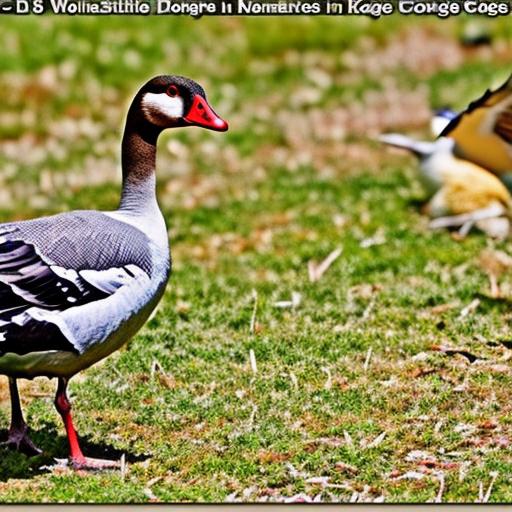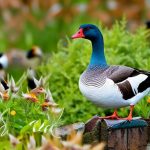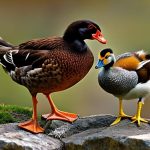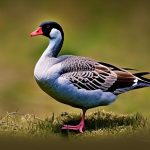Geese infestation is a common problem in many areas, especially near bodies of water. These birds can cause damage to property, create unsightly messes, and pose health risks. Therefore, it is important to implement effective geese control methods to prevent and manage infestations. In this post, we will discuss various types of geese deterrents that can be used to keep these birds away.
Key Takeaways
- Geese are social animals and tend to congregate in areas with water and food sources.
- Physical barriers such as fences and netting can be effective in keeping geese away from certain areas.
- Sound deterrents such as loud noises or predator calls can startle geese and make them leave.
- Visual deterrents such as decoys or reflective tape can create an unappealing environment for geese.
- Scent deterrents such as grape extract or dog urine can repel geese from certain areas.
Understanding the behavior of geese
Geese are highly adaptable birds that can thrive in a variety of environments. They are social animals that often travel in large flocks and are known for their honking calls. Geese are attracted to areas with open spaces, water sources, and ample food supply. They are also territorial creatures and can become aggressive when they feel threatened or when protecting their nests.
Understanding the behavior of geese is crucial in choosing the right deterrents. For example, knowing that geese are attracted to open spaces can help in implementing physical barriers or visual deterrents that make the area less appealing to them. Additionally, understanding their territorial nature can help in using sound deterrents or trained dogs to scare them away.
Creating physical barriers to deter geese
Physical barriers are one of the most effective ways to keep geese away from an area. There are various types of physical barriers that can be used, such as fences, netting, or hedges. These barriers create a physical obstacle that prevents geese from accessing the area.
Fences can be made from materials such as wire mesh or plastic and should be at least three feet high to deter geese from flying over them. Netting can be used to cover areas such as ponds or gardens to prevent geese from landing or accessing the area. Hedges can also be planted around the perimeter of an area to create a natural barrier that geese are less likely to cross.
Using sound deterrents to keep geese away
Sound deterrents can be an effective way to repel geese. These deterrents work by emitting loud noises or sounds that are unpleasant to geese, causing them to leave the area. There are various types of sound deterrents available, such as sonic devices, ultrasonic devices, or predator calls.
Sonic devices emit loud noises or distress calls that mimic the sounds of predators or other geese in distress. Ultrasonic devices emit high-frequency sounds that are inaudible to humans but are irritating to geese. Predator calls, such as those of hawks or falcons, can also be used to scare off geese.
Implementing visual deterrents for geese control
Visual deterrents can be used to scare off geese by creating a visual threat or making the area less appealing to them. These deterrents work by using visual cues that geese associate with danger or discomfort. There are various types of visual deterrents that can be used, such as scarecrows, reflective tape, or decoy predators.
Scarecrows can be placed in open areas to create a visual threat and deter geese from landing or approaching. Reflective tape can be hung from poles or fences and creates flashes of light that disorient geese and make them uncomfortable. Decoy predators, such as plastic owls or hawks, can also be placed in the area to create the illusion of a threat and scare off geese.
Utilizing scent deterrents to repel geese
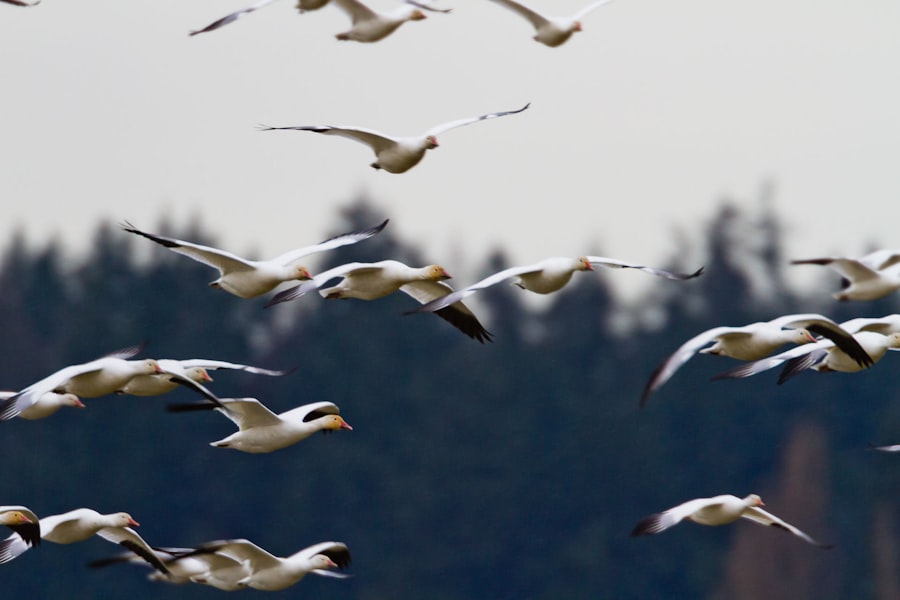
Scent deterrents can be used to repel geese by creating an unpleasant smell that they associate with danger or discomfort. These deterrents work by using natural scents that are unappealing to geese. There are various types of scent deterrents available, such as grape extract, citrus oils, or predator urine.
Grape extract can be sprayed on grass or vegetation to create a scent that geese find unappealing. Citrus oils, such as lemon or orange, can also be used to create a strong scent that repels geese. Predator urine, such as that of coyotes or foxes, can be applied around the perimeter of an area to create the illusion of a predator and scare off geese.
Maintaining a clean and unattractive environment for geese
Keeping the environment clean and unattractive to geese is an important aspect of geese control. Geese are attracted to areas with ample food supply, so it is important to remove any sources of food or water that may attract them. This includes cleaning up spilled birdseed, securing garbage cans, and removing any standing water.
Additionally, it is important to regularly maintain and mow grassy areas to make them less appealing to geese. Tall grass provides cover for geese and makes it easier for them to hide or nest. By keeping the environment clean and unattractive, you can discourage geese from staying in the area.
Installing motion-activated deterrent devices
Motion-activated deterrent devices can be used to scare off geese by creating sudden movements or loud noises when they approach. These devices work by detecting the motion of geese and activating a response that scares them away. There are various types of motion-activated deterrent devices available, such as sprinklers, lights, or air cannons.
Sprinklers can be set up in areas where geese are likely to gather and activate when they approach. The sudden burst of water scares off the geese and prevents them from landing or staying in the area. Lights can also be used to create sudden flashes or movements that startle geese. Air cannons emit loud noises or bursts of air that scare off geese when they approach.
Employing trained dogs to scare off geese
Trained dogs can be an effective and natural way to scare off geese. Dogs are natural predators to geese and their presence can create a sense of danger that causes geese to leave the area. There are various breeds of dogs that are commonly used for geese control, such as Border Collies or Labrador Retrievers.
To train a dog for geese control, it is important to work with a professional trainer who specializes in this type of training. The dog should be trained to respond to commands and be comfortable around water. The trainer will teach the dog how to chase and scare off geese without harming them.
Seeking professional help for geese management
In some cases, it may be necessary to seek professional help for geese management. Professional wildlife control companies have the knowledge and experience to effectively manage geese infestations. They can assess the situation, implement appropriate deterrents, and provide ongoing maintenance and monitoring.
When choosing a professional for geese management, it is important to research and select a reputable company with experience in dealing with geese infestations. They should have the necessary permits and licenses required by local regulations. Additionally, they should use humane methods that do not harm the geese or other wildlife.
Understanding legal regulations for geese control
It is important to understand the legal regulations for geese control in your area before implementing any deterrents or management strategies. Different areas may have specific laws or regulations regarding the control of geese, especially if they are protected species. It is important to comply with these regulations to avoid legal issues.
To understand the legal regulations for geese control in your area, you can contact your local wildlife agency or consult with a professional wildlife control company. They will be able to provide you with information on any permits or licenses that may be required and guide you on how to comply with the regulations.
Geese infestation can be a nuisance and cause damage to property. However, by implementing effective geese control methods, such as physical barriers, sound deterrents, visual deterrents, scent deterrents, maintaining a clean environment, using motion-activated deterrent devices, employing trained dogs, seeking professional help, and understanding legal regulations, it is possible to prevent and manage geese infestations. It is important for individuals and communities to take action to control geese infestation in their area to maintain a clean and safe environment.
If you’re looking for ways to keep geese away from your property, you might also be interested in learning how to convert a shed into a chicken coop. This article from Poultry Wizard provides step-by-step instructions on transforming a shed into a safe and comfortable home for your chickens. By repurposing an existing structure, you can create a coop that not only keeps your feathered friends happy but also helps deter unwanted geese. Check out the article here: https://poultrywizard.com/keeping-chickens/convert-shed-to-chicken-coop/.
FAQs
What are some effective methods to keep geese away?
Some effective methods to keep geese away include using visual deterrents like scarecrows or reflective tape, installing physical barriers like fences or netting, using noise deterrents like ultrasonic devices or loud noises, and applying taste deterrents to grass or plants.
Why is it important to keep geese away?
It is important to keep geese away because they can cause damage to property, create unsanitary conditions with their droppings, and pose a safety risk with their aggressive behavior, especially during nesting season.
Are there any natural ways to keep geese away?
Yes, there are natural ways to keep geese away such as planting tall grasses or shrubs to create an unappealing habitat for geese, using dogs to patrol the area and deter geese, and allowing natural predators like foxes or coyotes to roam the area.
How can I prevent geese from nesting on my property?
To prevent geese from nesting on your property, you can regularly mow grassy areas to make them less attractive for nesting, install barriers like fences or netting to block access to nesting sites, and use scare tactics like loud noises or motion-activated devices to discourage nesting behavior.
Is it legal to harm or kill geese to keep them away?
In many places, it is illegal to harm or kill geese as they are protected under wildlife conservation laws. It is important to check local regulations and seek humane methods of deterring geese without causing harm to them.
Meet Walter, the feathered-friend fanatic of Florida! Nestled in the sunshine state, Walter struts through life with his feathered companions, clucking his way to happiness. With a coop that’s fancier than a five-star hotel, he’s the Don Juan of the chicken world. When he’s not teaching his hens to do the cha-cha, you’ll find him in a heated debate with his prized rooster, Sir Clucks-a-Lot. Walter’s poultry passion is no yolk; he’s the sunny-side-up guy you never knew you needed in your flock of friends!

